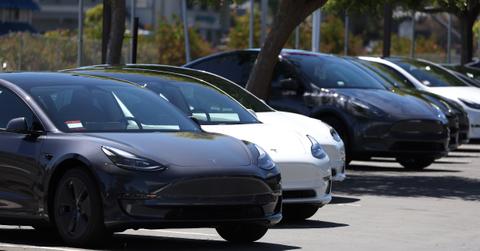The Car Chip Shortage Is Easing Up for Some, May Extend Into 2023
Supply shortages have impacted every industry, including automotive. Has the car chip shortage gotten any better? Here's what we know.
Sept. 15 2022, Updated 1:21 p.m. ET

Addressing the semiconductor chip shortage has been a grueling process for the White House and automakers. Those looking to buy a new car may have noticed it's harder to come by certain tech features and the cars that do have them are a bit pricier now. But Biden's CHIPS and Sciences Act has addressed the shortage. Since the act was passed, people want to know if the chip shortage has gotten better.
While some automakers have posted positive sales results, they're still figuring out how to cope with the shortage. Chips have been hard to find for over two years, and the shortage is expected to continue throughout 2022, and possibly even into 2023.

It might take some time for Biden's act to ease the shortage.
The CHIPS and Sciences Act is a $280 billion package and includes $52 billion in funding. The act seeks to address the shortage and eliminate the competition between the U.S. and China. Senator Brian Schatz said, "I do think this bill will have an immediate political impact, but not because people will feel the effects in the next six weeks. It's because they know we are lawmakers who weren't making very many laws over the last six months."
The factors limiting the supply of chips remain the same, with one major factor being that demand has surpassed what chip manufacturers can keep up with. The companies are dealing with labor shortages in production as well as logistics, resulting in chip deliveries being delayed.
Automotive and chip manufacturing companies both slowed their production during the COVID-19 pandemic as demand for cars and other electronics reliant upon chips dropped. However, these companies weren’t prepared for demand to surge later on, and they still haven't been able to catch up. Similar dynamics are creating shortages in the food industry, affecting restaurants, supermarkets, and retailers.
Semiconductor manufacturers not only provide chips for automobile companies, but for a plethora of tech companies. Companies that don’t even produce automobiles, such as Sony, Apple, and Microsoft, also battled supply shortages. Currently, the U.S. only produces 10 percent of the global supply of semiconductor chips while Asia produces 75 percent.
All automotive brands have been affected by the chip shortage.
All automotive brands have been affected by the chip shortage, even if they’ve posted positive sales results. In 2022, Tesla’s fourth-quarter and full-year sales were significantly higher than in the previous year. However, Elon Musk has stated that because of the chip shortage, there will be no new Tesla models released in 2022.
Meanwhile, Hyundai and Kia are optimistic amid the ongoing shortage, forecasting a 12.1 percent increase in their combined sales for 2022. Lexus also saw good results in 2021, almost topping its annual worldwide sales record with 760,012 vehicles sold. According to HotCars.com, Nissan, Jeep, and Ram have certain models that are still easy to find.
Volvo was another automaker to shed some positive light on the chip shortage. In July 2022, Volvo CEO Jim Rowan told CNBC that its semiconductor inventory was "back at [full] supply." Despite the progress that has been made, some sources suggest that the car chip shortage could extend into 2023.
